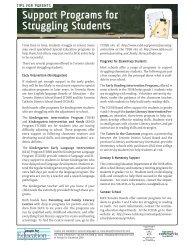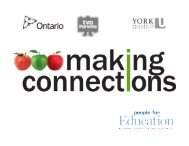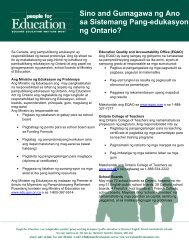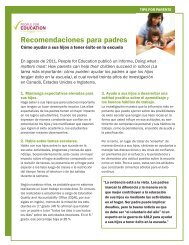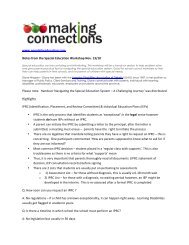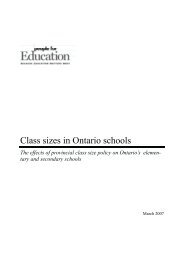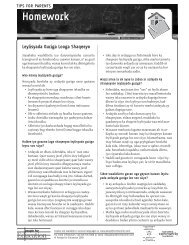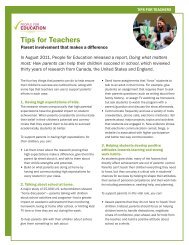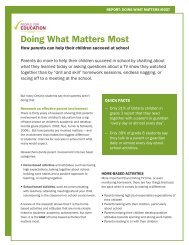Our Children Our Future Our Vision - People for Education
Our Children Our Future Our Vision - People for Education
Our Children Our Future Our Vision - People for Education
You also want an ePaper? Increase the reach of your titles
YUMPU automatically turns print PDFs into web optimized ePapers that Google loves.
<strong>Our</strong> <strong>Children</strong>, <strong>Our</strong> <strong>Future</strong>, <strong>Our</strong> <strong>Vision</strong><br />
actual costs associated with program components and not be subject to discretionary caps”. 171<br />
INAC’ response was that: “the responsibility <strong>for</strong> financing post-secondary education should be<br />
shared by learners and their families, according to their financial circumstances. It agrees that levels<br />
of support provided through [INAC] PSE programs should take into account the real needs of<br />
learners, but this does not mean trying to meet all of the costs they incur in pursuing post-secondary<br />
education. Instead, the Government will take a closer look at the overall efficiency of programming<br />
and ways to improve upon it.” 172<br />
An internal audit of PSE revealed significant management and administrative problems in INAC’s<br />
handling of the program. 173 INAC followed up with an internal review and turned their focus on<br />
alternative delivery mechanisms <strong>for</strong> the program, rather than focussing on solidifying reporting<br />
mechanisms to improve analysis of data and trends to bolster student achievement and continuing<br />
to prioritize program development <strong>for</strong> post-secondary education with Indigenous knowledge<br />
foundations.<br />
Currently there are six First Nation Institutes of Higher Learning functioning in Ontario. These<br />
include the Anishinabek <strong>Education</strong> Institute, the First Nations Technical Institute, the Iohahiio<br />
Akwesasne Adult <strong>Education</strong>, the Kenjgewin Teg <strong>Education</strong>al Institute, the Oshki-Pimache-O-Win<br />
<strong>Education</strong> and Training Institute and the Six Nations Polytechnic Institute. These institutes receive<br />
funding support <strong>for</strong> the development and delivery of First Nation Post-Secondary programs from<br />
two primary sources:<br />
(1) Federally - Indian Studies Support Program, Indian and Northern Affairs<br />
Canada at approximately $3.9 million.<br />
(2) Provincially - Aboriginal Post-Secondary funding from the Ministry of<br />
Training, Colleges and Universities at $3.2 million. 174<br />
However, these funds are insufficient to meet the current learning needs and capacity requirements<br />
of First Nations or that of Canada which is facing a critical labour <strong>for</strong>ce shortage. Consequently,<br />
these Ontario First Nation Institutes are <strong>for</strong>ced to find funds from other federal and provincial<br />
departments and ministries as well as industry <strong>for</strong> the development and delivery of required<br />
programs.<br />
171 Standing Committee on Aboriginal Affairs and Northern Development, “No Higher Priority: Aboriginal Post-Secondary<br />
<strong>Education</strong> in Canada: Report of the Standing Committee on Aboriginal Affairs and Northern Development”<br />
(Ottawa: Speaker of the House of Commons Canada, 2007) [No Higher Priority] at xi.<br />
172 Government of Canada, “Government Response to the Sixth Report of the Standing Committee on Aboriginal Affairs<br />
and Northern Development: No Higher Priority: Aboriginal Post-Secondary <strong>Education</strong> in Canada”, online: .<br />
173 Audit of PSEP, 2009, supra note 169 at 6.<br />
174 R, Mosquito, Aboriginal Institutes Consortium, “Briefing Note to Chiefs in Ontario re Accreditation of Aboriginal<br />
Institutes” (Thunder Bay: AIC, 2010).<br />
Chiefs of Ontario<br />
42



